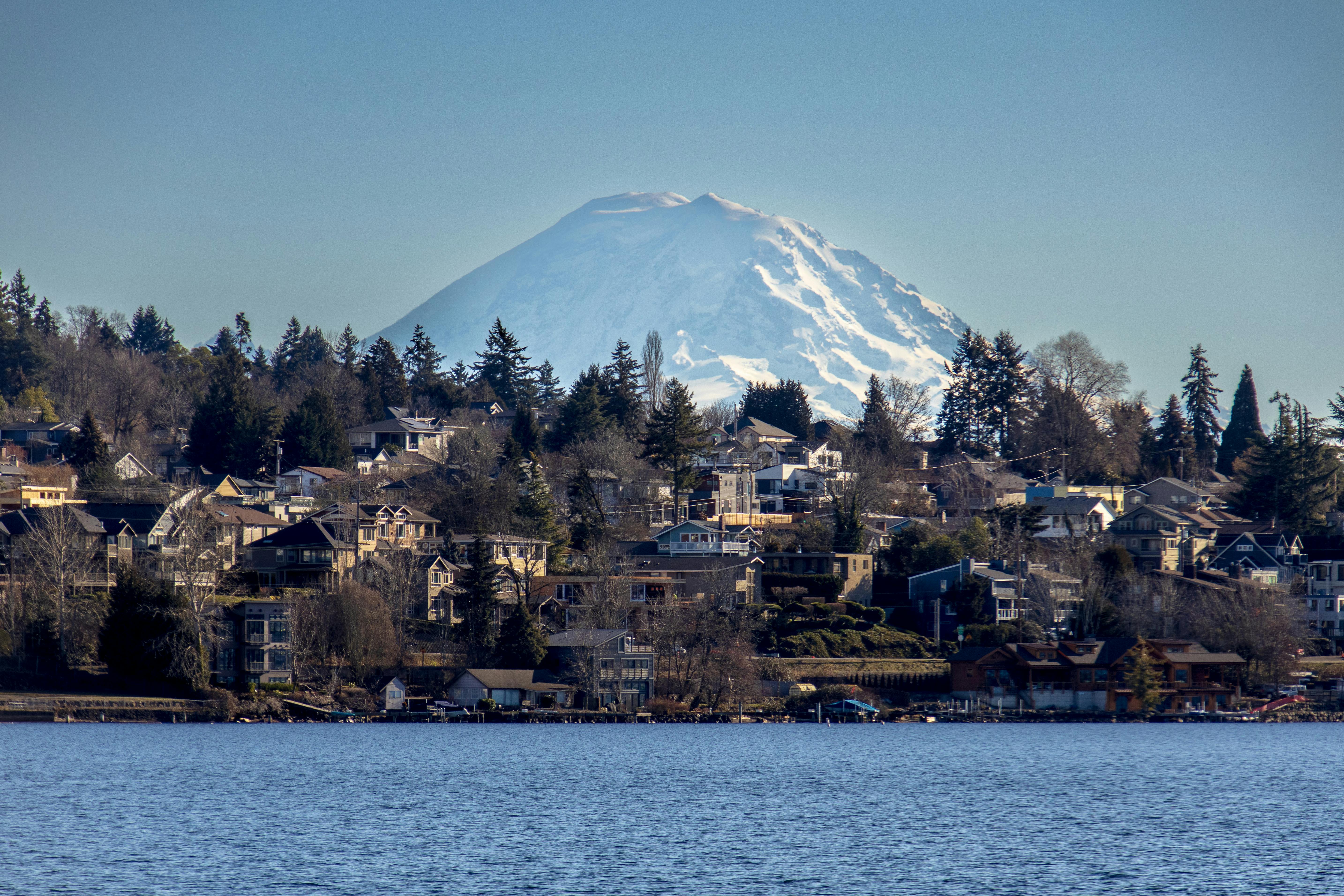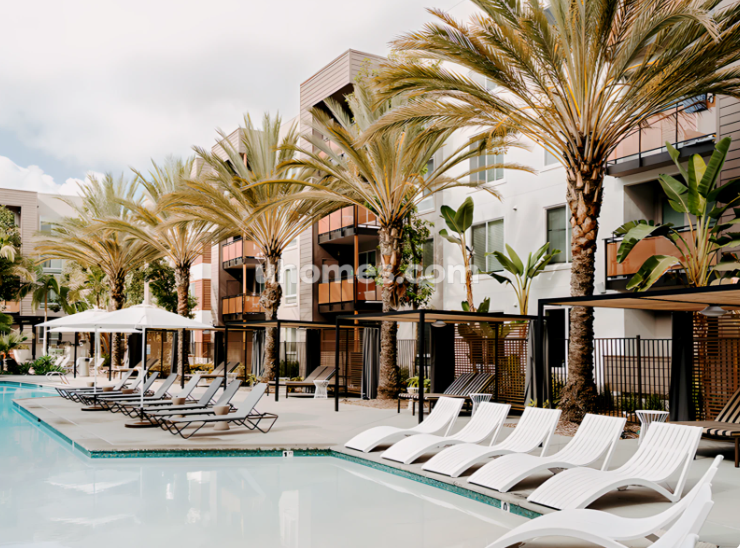Are you considering living in Seattle? Whether for work, studies, a pursuit of adventure, or simply curiosity, the Emerald City has a lot to offer. Living in Seattle, Washington, means everything—diverse natural landscapes, countless job prospects, a range of learning opportunities, urban charm, cultural richness, and so much more. Don’t get too excited just yet—no place is perfect. If you’re wondering whether Seattle is a good place for you to live, take a moment to weigh the pros and cons with our guide.
Pros and Cons of Living in Seattle
Natural Environment and Climate
Pros:
Seattle is commonly known as “the Emerald City” primarily due to its evergreen vegetation, abundant natural landscapes, and its commitment to sustainable development. All contributions make life in Seattle an exceptional experience. The mild and humid climate facilitates all-year-round lush and green foliage, making the city resemble a glistening emerald. Surrounded by mountains and bodies of water, Seattle boasts a wealth of natural beauty, such as Olympic National Park, Mount Rainier, and the Cascade Range, contributing to the city’s endless shades of green. On this basis, the Seattle government actively promotes green planning, building numerous parks and green spaces like Washington Park Arboretum and Discovery Park. The measure beautifies the urban environment and enhances residents’ high quality of life in Seattle.
Seattle is located in a maritime climate zone characterized by a mild climate. The winters are not harsh, while the summers are cool and not sweltering. The temperate climate allows residents to comfortably enjoy outdoor activities all year round. Whether hiking in the mountains, cycling along the waterfront, or simply enjoying a picnic in one of the city’s many parks, the pleasant weather makes it easy to stay active. The constant engagement with the outdoors also fosters a deep connection to nature, creating a unique sense of place that defines living in Seattle, WA. Additionally, indoor life in Seattle is particularly comfortable, especially during the summer. Typically, summer temperatures range between 25°C and 29°C., saving the cost of air conditioning.

Cons
Though the city is renowned for its natural beauty and mild climate, moving to Seattle, Washington, also comes with some challenges, especially for low-income and vulnerable populations. For example, during the hot and dry summers, there is a risk of wildfires, which can lead to a decline in air quality in the city. Wildfires can affect those with respiratory diseases. Additionally, with its numerous surrounding bodies of water, Seattle is not only blessed with scenic views and recreational activities but also faces the threat of flooding, especially in coastal areas.
Of course, these challenges aren’t insurmountable. Seattle’s government is actively addressing these challenges, such as developing adaptive policies, creating resilience districts, and leveraging external funding support. These measures will actively tackle the challenges brought by climate change and bring peace of mind to people living in Seattle, WA.
Cost of Living
Pros
One of the benefits of moving to Seattle, Washington, is that there is no income tax, which means residents can get more take-home pay, helping to offset the high cost of living.
Secondly, when moving to a major city like Seattle, WA, housing expenses are always a big concern. Seattle’s housing costs are much lower compared to other large cities such as San Francisco and Los Angeles. For example, as of March 2025, the average home price in Seattle is $965,331, while in San Francisco, it is $1,290,350. The average rent in Seattle is $2,148/month, compared to $2,851 in San Francisco. As a result, many people choose to live in Seattle.
In addition, Seattle has relatively low transportation costs, and as a pedestrian-friendly city, living here helps to save a lot of money on transportation.
Cons
While Seattle’s high quality of life is enviable, one of the biggest pressures of Seattle’s life is its high cost of living, which is about 80% higher than the national average. Among these, housing prices are 224% of the national average, which is a huge burden for many residents. In terms of food, Seattle is about 10% higher than the national average.
Therefore, before considering whether you should move to Seattle, Washington, it is essential to fully understand the cost of living in Seattle and determine whether you can afford it.
Job Opportunities
Pros
For people seeking more job opportunities and higher salaries, there are many reasons to live in Seattle. As a globally renowned tech hub, Seattle is home to Amazon and Microsoft. These tech giants provide a plethora of high-paying positions and drive the rapid expansion of the industry, with an increase in demand for software developers, data scientists, and cybersecurity experts. In addition to the tech sector, Seattle also offers job opportunities in healthcare, engineering, finance, education, creative arts, and manufacturing.
The average annual salary in Seattle is $124,473, which is $49,324 higher than the national average. Although the cost of living in Seattle is relatively high, the high income level helps residents cope with this issue. Therefore, many people prefer living in Seattle, WA, despite the economic pressure. The population growth trend shows an increase of over 100,000 residents every decade, reflecting Seattle’s characteristics as a livable city.
Seattle also has a low unemployment rate of 4.4%, lower than the national average. The data shows that the pressure of unemployment is lower, promoting a sense of well-being and a high quality of life in Seattle.
Cons

The abundance of job opportunities has also created a highly competitive job market. High-skilled talents worldwide are flocking to Seattle, which means job seekers face fierce competition when applying for positions. Therefore, people who choose to live in Seattle for job opportunities should be prepared for this intense situation and a potentially lengthy job search process.
Educational Resources
Pros
Seattle boasts abundant educational resources and is renowned for its high-quality academic standards, especially in higher education. Several world-famous institutions of higher learning attract students to study and move to Seattle, WA. For example, the University of Washington is one of the world’s top public research universities, particularly leading globally in medicine, life sciences, and computer science. Seattle University is also well-known for its high-quality education and diverse curriculum. Seattle is also home to many community colleges and vocational schools that offer excellent learning platforms for students who wish to enter the workforce quickly.
Seattle’s educational environment is highly diverse. Its educational system reflects an international perspective, being very friendly to international students. Universities in Seattle also have specific offices, providing visa guidance, language tutoring, and psychological counseling to help international students adapt to life in Seattle.
Seattle is one of the most educated cities in the United States. In a study by Central Connecticut State University on the literacy skills of residents in U.S. cities, Seattle ranked second among the nation’s major cities, just behind Washington, D.C. In terms of educational attainment, the proportion of the population with a college degree in Seattle is as high as 57.7%, the highest among all the cities examined. The vibrant and knowledgeable community gives reasons for people seeking a well-educated and innovative environment to live in Seattle.
Cons
The higher education field in Seattle is highly competitive. For students, gaining admission to top universities and specialized courses requires exceptional academic performance and a rich portfolio of extracurricular activities. To obtain a dream university in Seattle necessitates a significant investment of effort, time, and perseverance.
International students face an even greater challenge. Even after successfully entering dream schools, international students may still encounter issues such as language barriers, cultural differences, and adapting to a new educational system. Adapting to Seattle’s life can be a problem, too. However, there is no need to worry excessively, as universities in Seattle offer substantial support to help mitigate these problems. For example, the University of Washington offers ESL courses. If language proficiency does not meet the university’s admission requirements, students can still apply but must enroll in the AEP course for the first semester. Only after completing the AEP course can students proceed to study major at the graduate level.
Urban Infrastructure
Pros
Seattle’s public transportation system is rapidly expanding to meet the needs of its growing population. For instance, the East Link Extension was launched in April 2024, and the Lynnwood Link Extension was inaugurated in August 2024. Sound Transit’s Link Light Rail is one of the most ambitious expansion projects in the United States, with plans to add 116 miles of light rail by 2041. In addition, Seattle is increasing bike lanes and pedestrian-friendly streets, encouraging residents to choose greener modes of transportation and enhancing Seattle’s quality of life.
Seattle is at the forefront of clean energy and sustainable development. For example, the city government is promoting zero-emission goals at the port, aiming to achieve net-zero emissions by 2040. This measure will significantly improve air quality and enhance the city’s sustainability, thereby attracting more people moving to Seattle, WA.
Furthermore, Seattle is making substantial investments in modernising its infrastructure, including upgrading the power grid and replacing ageing equipment, laying a solid foundation for future development.
Cons
Traffic congestion is a prominent issue in Seattle. During peak hours, the traffic volume on major roads and bridges is extremely high, leading to extended commuting times and causing a lot of inconvenience in people’s lives in Seattle.
The government has taken note of this serious problem and is implementing a series of measures to improve the traffic situation. For example, intelligent traffic signal technology can adjust signal timing based on real-time traffic data, thereby reducing congestion. In addition, the municipal government is considering introducing a congestion pricing policy to facilitate traffic flow during peak hours.
uhomes.com Makes Living in Seattle Easy
When you make up your mind to move to Seattle, WA, we hope you are fully prepared to embrace this vibrant and opportunity-filled city. As you embark on this exciting new chapter, uhomes.com wishes to help you find a warm home.
We are a global student housing booking platform offering comprehensive rental information and professional services. Our Seattle housing options are diverse, ranging from student apartments to traditional apartments and hotels. We understand that the cost of living in Seattle is high, so we provide housing at various price points, with the lowest prices starting from $786 per month. In addition, we offer exclusive listings, exclusive discounts, and the highest cashback on the web, allowing you to rent the most suitable home at the best deals.
We not only provide comprehensive housing information but also offer lifestyle guides and advice to help you better adapt to your new life in Seattle. If you need any assistance, including but not limited to housing information and lifestyle tips, please feel free to contact us.
Conclusion
There is no doubt that living in Seattle is a very attractive proposition. Its beautiful natural scenery, diversified economy, and rich cultural atmosphere draw many people to the Emerald City. However, you should also be prepared for the high cost of living and the competitive job market. By weighing the pros and cons of living in Seattle, including factors like the natural environment, climate, cost of living, job opportunities, educational resources, and urban infrastructure, we believe you can make an informed decision on whether Seattle, WA, is a good place to live for you.
FAQ
Is Seattle a safe city?
According to Gallup polls, 63% of respondents consider living in Seattle the safest, only trailing behind Dallas (74%) and Boston (72%). Like other large cities, areas like Downtown, Capitol Hill, and Pioneer Square still experience higher rates of theft and vandalism. When moving to the city or searching for student housing, residents and students may opt for safer neighborhoods like North Beach, Loyal Heights, or Madrona.
Where is Seattle located?
Seattle is located in the northwestern part of Washington State in the United States and serves as the seat of King County. To the west, it faces Puget Sound; to the east, it is bordered by the Cascade Range; and to the north, it is adjacent to Lake Washington. Living in Seattle means breathtaking and diverse natural landscapes, as well as abundant opportunities for hiking and outdoor activities.
What is Seattle known for?
Seattle is renowned for its iconic Space Needle, the breathtaking views of Mount Rainier, and Pike Place Market, the birthplace of Starbucks. Its coffee culture, seafood cuisine, alt-rock and grunge music scene, top-ranked University of Washington, Broadway tours, and stunning beaches have attracted tourists, students, and relocators living in Seattle.
Is Seattle a good place to live?
Seattle is a nice place to live for people who seek ample job opportunities, high quality of life, higher take-home pay, excellent educational institutions, and a rich cultural, artistic, and musical atmosphere, and can accept a higher cost of living, limited sunshine, traffic congestion, and the risk of natural disasters.








